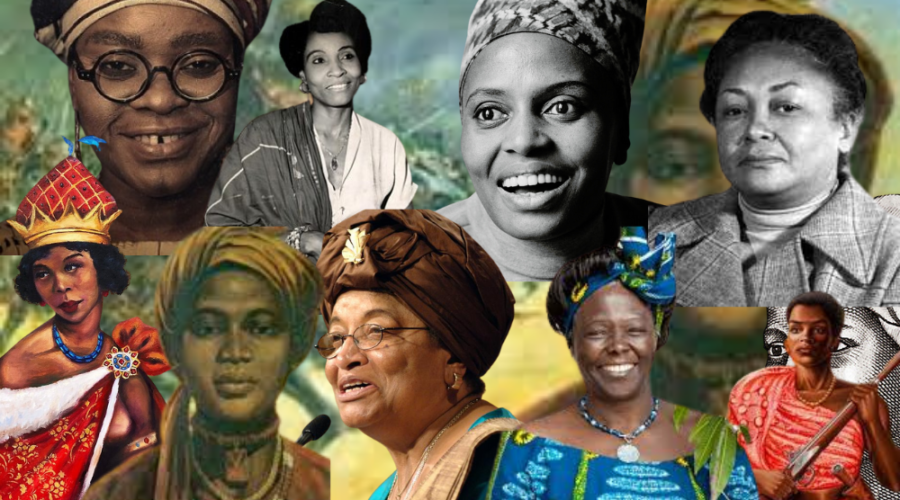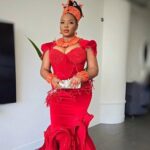History is often told through the lens of kings and conquerors, yet it is the resilience of Black women—warriors, thinkers, leaders and visionaries—that has profoundly shaped the world. We explore the stories of women who not only shattered expectations but also rewrote history.
Wangari Maathai (Kenya)
Wangari Maathai grew up in rural Kenya, admiring the lush forests that surrounded her. As she grew older, she witnessed widespread deforestation leading to poverty and environmental degradation. Determined to restore the land, she founded the Green Belt Movement in 1977, empowering women to plant millions of trees.
Despite facing opposition, arrest, and imprisonment, she remained steadfast, believing that reforesting the land would improve lives. Her perseverance earned her the Nobel Peace Prize in 2004, making her the first African woman to receive the award.
Wangari’s legacy lives on in the millions of trees she helped plant and in the global movement she inspired, proving that one determined individual can make a lasting impact on the planet.
Ellen Johnson Sirleaf (Liberia)
Ellen Johnson Sirleaf grew up in Liberia with a passion for education and leadership. After studying abroad, Sirleaf returned home to fight for democracy, often facing imprisonment and exile under oppressive regimes.
Undeterred, she ran for president and, in 2006, made history as Africa’s first elected female head of state, leading Liberia’s recovery from civil war.
Her presidency focused on rebuilding institutions, promoting women’s rights, and fighting corruption. In 2011, she was awarded the Nobel Peace Prize for her role in advancing peace and gender equality. Sirleaf’s leadership paved the way for women in politics, proving that resilience and vision can transform a nation.
Funmilayo Ransome-Kuti (Nigeria)
Funmilayo Ransome-Kuti was a fearless Nigerian activist who fought for women’s rights and social justice. In the 1940s, she led protests against unfair taxation on women, mobilising thousands through the Abeokuta Women’s Union. Her activism challenged colonial and traditional power structures, earning her the nickname “Lioness of Lisabi.”
A champion of education and democracy, she was the first Nigerian woman to drive a car and a strong advocate for independence. Her relentless activism inspired generations, including her son, Fela Kuti. Funmilayo’s legacy remains a symbol of courage, proving that one woman’s voice can spark lasting change.
Yaa Asantewaa (Ghana)
Yaa Asantewaa, the Queen Mother of the Ashanti Empire, became a legendary leader when she led the War of the Golden Stool against British colonial forces in 1900. Outraged by the exile of the Ashanti king, she rallied her people, declaring that if the men would not fight, the women would. With fierce determination, she led a powerful resistance, though the British ultimately overpowered them.
Despite her capture and exile, Yaa Asantewaa’s bravery became a symbol of African resistance against colonial rule. Her legacy lives on as an inspiration for women in leadership and the fight for freedom across Ghana and beyond.
Leymah Gbowee (Liberia)
Leymah Gbowee was a Liberian peace activist who led a powerful movement of women to end her country’s brutal civil war. In the early 2000s, she united Christian and Muslim women in nonviolent protests, sit-ins, and prayers, demanding peace from warring factions. Their relentless efforts forced leaders to negotiate, leading to the war’s end in 2003.
Her activism paved the way for Liberia’s first female president, Ellen Johnson Sirleaf, and earned her the Nobel Peace Prize in 2011. Gbowee’s story proves that ordinary women, united by a cause, can achieve extraordinary change.
Miriam Makeba (South Africa)
Miriam Makeba, known as “Mama Africa,” used her powerful voice to fight against apartheid and injustice. Rising to fame as a singer, she blended African rhythms with global sounds, spreading messages of hope and resistance. After speaking against apartheid at the UN in 1963, she was exiled from South Africa for over 30 years.
Despite her exile, Makeba continued to use music as a tool for activism, inspiring the world with songs like Pata Pata. She returned home after Nelson Mandela’s release and remained a symbol of resilience. Her legacy lives on as the Voice of Africa, proving that music can be a force for freedom.
Ngozi Okonjo-Iweala (Nigeria)
Ngozi Okonjo-Iweala is a Nigerian economist who made history as the first African and first woman to lead the World Trade Organization (WTO). As Nigeria’s finance minister, she spearheaded economic reforms, negotiated debt relief, and fought corruption, earning global recognition for her leadership.
Her expertise has shaped international finance, serving at the World Bank and on global advisory boards. Despite challenges, she shattered glass ceilings, inspiring African women in economics and governance. Okonjo-Iweala’s impact proves that with knowledge and determination, barriers can be broken.
Charlotte Maxeke (South Africa)
Charlotte Maxeke was a pioneering South African scholar and activist who fought for both women’s rights and racial equality. As the first African woman to graduate with a university degree in South Africa, she used her education to challenge the oppressive systems of her time, advocating for the empowerment of women and the advancement of African communities.
Maxeke’s activism extended to organizing women’s groups and speaking out against apartheid policies. She helped establish the Bantu Women’s League and was a key figure in the ANC Women’s League. Her legacy as a scholar and leader remains an inspiration for those fighting for social justice and education.
Chioma Ajunwa (Nigeria)
Chioma Ajunwa made history as Nigeria’s first Olympic gold medallist, winning gold in the long jump at the 1996 Atlanta Olympics. Her victory shattered records and broke barriers for women in Nigerian sports, proving that with determination, anything is possible.
Ajunwa’s achievement was a landmark moment in Nigerian athletics, inspiring future generations of athletes. Her golden legacy continues to inspire young athletes, particularly women, across Africa and beyond.
Octavia Butler (USA)
Octavia Butler was a groundbreaking American science-fiction writer, noted for her powerful storytelling that often explored themes of race, gender and power. As the first African American woman to gain widespread recognition in the genre, she became a literary trailblazer.
Her works, including Kindred, Parable of the Sower, and Fledgling, challenged societal norms and explored complex characters navigating dystopian worlds.
Butler’s writing broke barriers by blending speculative fiction with social commentary, urging readers to reflect on the future through the lens of social justice. Her legacy continues to inspire generations of writers and readers, solidifying her as one of the most influential voices in science fiction.
The resilience and contributions of Black women throughout history have profoundly influenced the world. These women, often overlooked in historical narratives, have been warriors, thinkers, leaders, and visionaries who reshaped their societies.
Wangari Maathai from Kenya founded the Green Belt Movement in 1977 to combat deforestation and poverty by empowering women to plant trees, despite facing significant opposition. Her work led to her becoming the first African woman to win the Nobel Peace Prize in 2004. Ellen Johnson Sirleaf of Liberia, Africa's first elected female head of state, played a crucial role in rebuilding her nation post-civil war, focusing on peace and gender equality, which earned her the Nobel Peace Prize in 2011.
Other notable figures include Funmilayo Ransome-Kuti, who bravely fought for women’s rights and justice in Nigeria, and Yaa Asantewaa of Ghana, who led a resistance against British colonialism. Leymah Gbowee, also from Liberia, led a women's peace movement that was instrumental in ending civil war, and Miriam Makeba from South Africa used her music to protest apartheid despite her exile.
Ngozi Okonjo-Iweala made history as the first African and woman to lead the WTO, advocating economic reforms and combating corruption. The scholarly activism of Charlotte Maxeke advanced women's rights and racial equality in South Africa. Chioma Ajunwa's Olympic gold in 1996 marked a significant milestone for Nigerian sports, while Octavia Butler redefined science fiction by infusing social justice themes into her storytelling.
These women's stories highlight how determination and a visionary mindset can lead to monumental change, inspiring generations and breaking down barriers across diverse fields.






